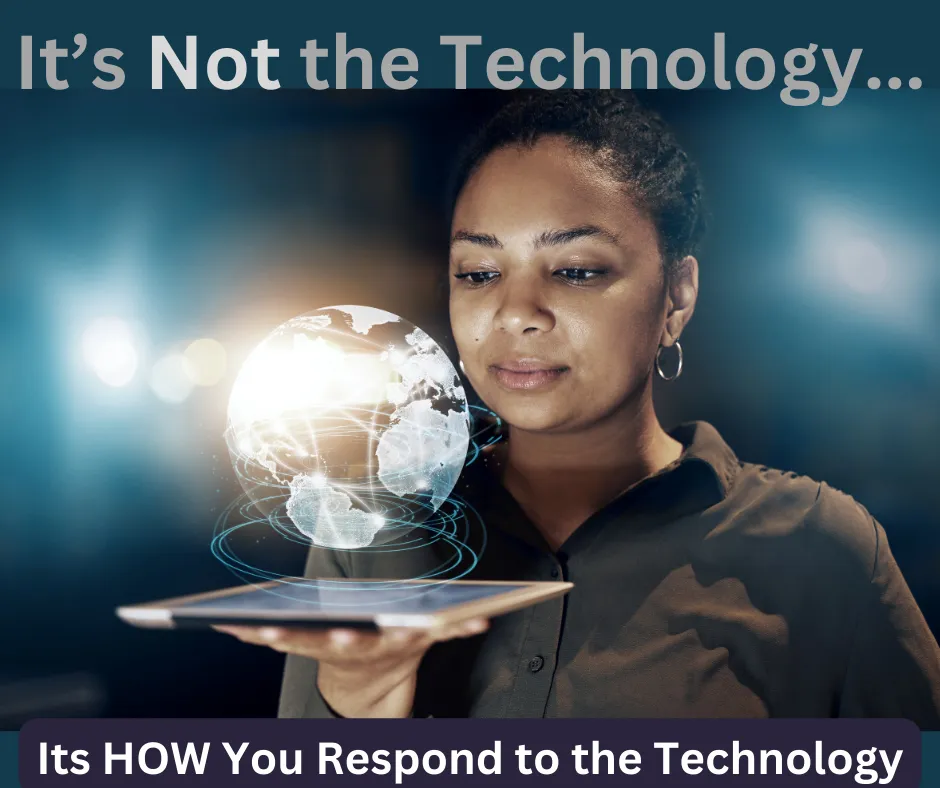The Me Mastery Blog
Take Actions That Change Your Life For The Better!

It's Not the Technology. It's HOW You Respond to the Technology!
Adapting to Technological Change: Keeping up with Rapid Technological Advancements and Their Impact on Your Job
By Dr. Marcus Mottley
These days, in the age of electrical vehicles and artificial intelligence, keeping up with technological advancements is not just a matter of staying current—it's about staying relevant.
As professionals try to navigate through waves of new software, tools, and methodologies, the pressure to adapt can be overwhelming. The emotional toll it takes on us can sometimes be as challenging as the learning curve itself.
Many professionals struggle with this rapid pace of change, not because they lack the skills, but because the constant need to adapt can be emotionally exhausting. This can lead to feelings of inadequacy and anxiety, as the fear of becoming obsolete looms large. The emotional stress associated with continuous learning and adaptation can hinder performance, leading to a cycle of stress and frustration.
However, it's crucial to approach these challenges with effective emotional strategies that not only foster professional growth but also support emotional well-being. Here are some strategies that can help:
1. Embrace a Growth Mindset: Cultivating a growth mindset is fundamental in adapting to technological change. View each new tool or software as an opportunity to expand your skill set and improve your capabilities. Remember, competence breeds confidence, and approaching technology with curiosity rather than fear can make learning an exciting rather than daunting experience. If you want more on this, purchase a book or take a course on this subject (like our Growth Mindset Course. Or, if you aren’t a member already, then consider joining our Free Emotional Growth Community here.
2. Set Realistic Goals: Break down the learning process into manageable goals. This reduces the overwhelming nature of mastering new technologies and provides a clear roadmap for progress. Celebrate small victories along the way, which can boost your morale and encourage continued effort.
3. Seek Support: You're not in this alone. Engage with peers who are also learning or have mastered the technology. Many workplaces offer training sessions and workshops—take advantage of these resources. Additionally, consider mentorship or coaching, where more experienced colleagues can guide you through the technological landscape.
4. Maintain a Healthy Work-Life Balance: It’s vital to give yourself time to recharge. Continuous learning without breaks can lead to burnout. Ensure you allocate time for relaxation and activities you enjoy, which can improve your resilience and mental energy.
5. Manage Stress Effectively: Practicing stress management techniques such as mindfulness, meditation, or even simple breathing exercises can greatly reduce the anxiety associated with technological change. When you feel overwhelmed, these techniques can help restore calm and focus.
6. Reflect on Your Progress: Regular reflection on what you’ve learned and how you’ve adapted can provide a significant emotional lift. Acknowledge the effort you’ve put in and the growth you’ve achieved. This reflection can shift your perspective from seeing change as a hurdle to viewing it as a valuable part of your professional journey.
Adapting to technological change is as much about managing your emotions as it is about acquiring new skills. By implementing these strategies, you can navigate the ever-evolving technological landscape with less stress and more confidence.
Remember, the goal isn't just to keep up, but to thrive in the face of change. I think the real goal is to achieve mastery not only of the technological advancements, but to achieve mastery over how you respond to technological advancements which will increase exponentially!
If you are not already a member, you can join our FREE Emotional Growth Community of professionals and get free training articles, ebooks and video courses.
© 2024 All Rights Reserved - Dr. Marcus Mottley

